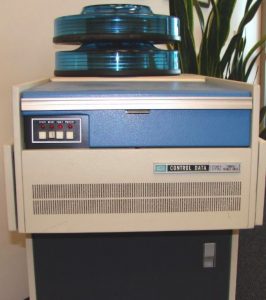History (1973): Control Data Corporation HDD Departs From IBM Standards
With CDC 9762 SMD and two disk packs
This is a Press Release edited by StorageNewsletter.com on March 21, 2018 at 2:45 pmThis article comes from the Computer History Museum.
1973: CDC disk drive departs from IBM standards
First significant departure from the IBM HDD technology & media path
CDC 9762 SMD and two disk packs

(Seagate – photos by Gary Sorenson)
The Control Data Corporation (CDC) Normandale disk drive operation in Edina, Minnesota departed from IBM standards and technology in a project launched in 1972 for a new removable media product to compete with the rumored ‘Winchester’ system.
Already a leading supplier of disk drives for its own computers, as well as to other OEMs, in the past the company had generally followed IBM’s lead in media and technology. In this case, CDC did not have access to IBM’s new contact/start stop head design and wished to avoid the expensive complex removable head disk assembly of the 3340 configuration.
Project manager Tom Murnan led a team that developed the first in a family of Storage Module Drive (SMD) products that CDC announced at the National Computer Conference (NCC) in New York City in 1973. The CDC 9760 comprised a rack-mountable disk drive with a non-IBM compatible removable 40MB 5-disk pack but at a higher level of recording density and performance (6,000bpi and 10Mb/s) achieved with a unique ramp-loaded head that flew at less than 30 microinches above the disk spinning at 3,600rpm.
After an 80MB (9762) version announced in 1974, 150MB (9764) and 300MB (9766) drives followed that for many years were the largest capacity removable packs on the market.
With the easy to attach SMD interface employed on a broad family of fixed and removable media drives, CDC shipped over 100,000 units by 1981 to become the world’s largest OEM disk drive supplier. After adoption as an ANSI disk standard in 1982, Ampex, Century Data, and more than 20 other manufacturers offered SMD compatible products.














 Subscribe to our free daily newsletter
Subscribe to our free daily newsletter

